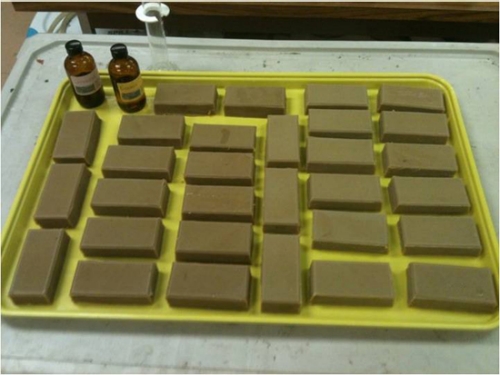Chemical Engineering Students Create Sustainable Soap
One of the most well-known student engineering projects on campus involves converting the cooking oil used by Dining Services into biodiesel fuel. Led by Adam Hoffman, ChE ’09, MSChE ’11, the student team behind this research wanted to take their project one step further to produce something beneficial from the reaction’s waste stream.
The conversion process from cooking oil to biodiesel fuel leaves behind glycerol. “Instead of disposing of the glycerol after it has been separated from the dirty biodiesel, we extend its product lifespan by using it to make something that everyone needs: soap,” says Hoffman.
Although the soap is considered a cosmetic rather than a detergent by FDA standards because of its glycerol base, it still lathers, suds, cleans, and leaves hands feeling silky smooth after a cleansing scrub.
The team can make a crude bar of soap in one day, since the reaction only takes 20 minutes, but it must sit for weeks to harden to its proper consistency. When it is ready, they use it to clean lab equipment and distribute it to fellow members of the College of Engineering for communal use.

“The entire process involves a simple chemical reaction, which is why I think it would be a great project for new engineers to experience. I would love to see students getting involved with these green projects as soon as they arrive at Villanova and adopting them as their own. It’s fun to make something concrete, so this soap has the potential to really capture their interest,” says Hoffman, who will finish his master’s program and leave Villanova in the spring.
The future of the project rests in the hands of Hoffman’s protégés – his undergraduate lab assistants. He hopes that the project will continue to develop and that future endeavors will help improve the University’s ranking on the Sierra Club’s Cool Schools list. This year, Villanova ranked 53 due in part to projects like this and other initiatives, such as the geothermal cooling and water regulation systems placed in Fedigan Hall, the elimination of trays in the dining halls, the compost program for Dining Services to reduce waste, and the compostable Potatoware cutlery used on campus.
So, the question remains: What will the team do with all of the soap they continue to make?
“Although the soap is really useful when it comes to cleaning glassware in the lab, it has greater potential. Maybe we can stamp it with a Villanova “V” and sell it in the bookstore. We’ve already added lavender and fragrant herbs to make it smell more appealing and less like an oil fryer. Now, we just have to work on dyeing it Villanova blue!” jokes Hoffman.
